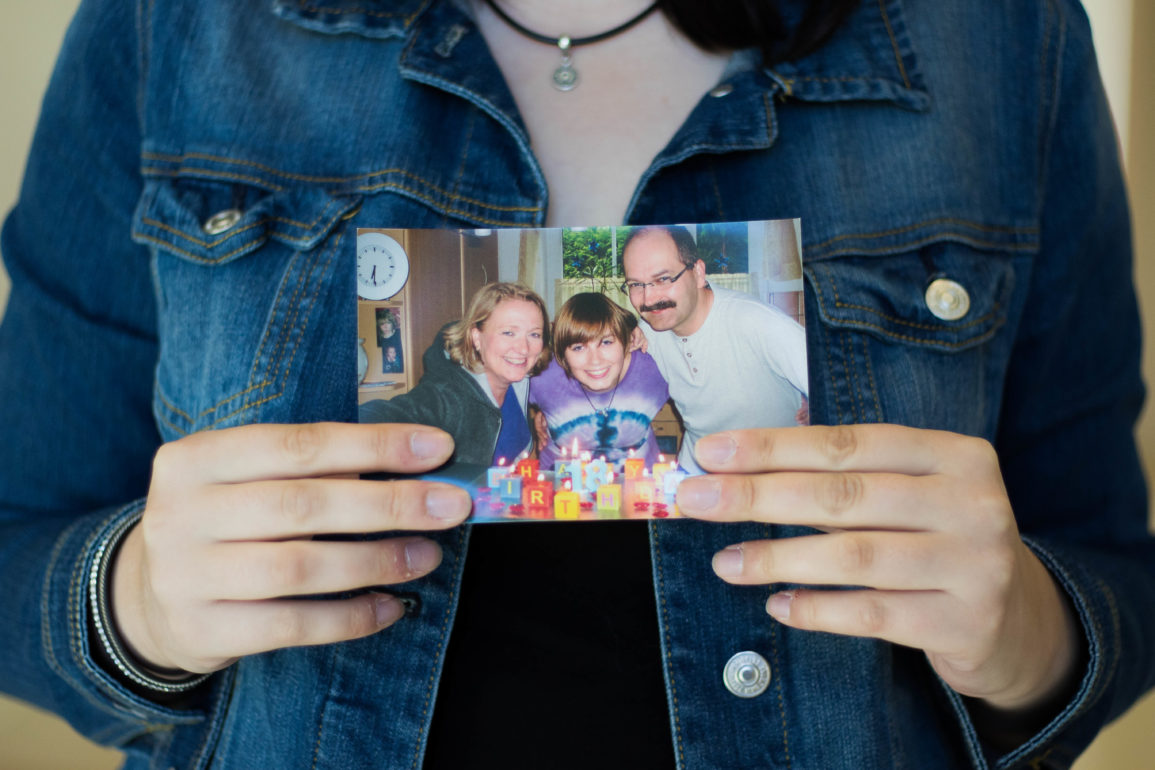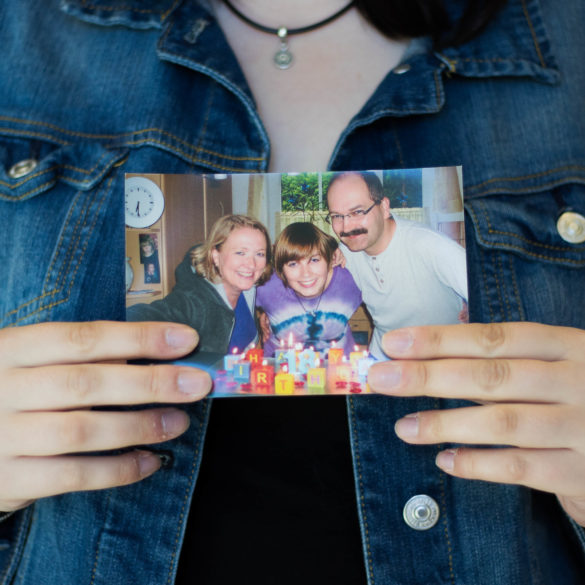It’s New Year’s Eve in Ludenscheid, Germany, but Lisa Tuech can’t be found among the crowd of people giddy with the excitement of staying up for a midnight countdown. Instead, she has to catch a plane to the United States early the next morning.
A German New Year tradition is bleigiessen, which involves melting small pieces of lead shaped like good luck charms of clovers and pigs in a spoon over a candle. The liquefied lead is poured in cold water, and it hardens to form a new shape. The new shape the piece resembles is supposed to represent how the upcoming year will go.
Bleigiessen is traditionally performed at midnight, the beginning of the new year. Lisa’s family, however, did bleigiessen early and had their own personal celebration. They headed to bed around 10 o’clock, and tried to fall asleep amid the sounds of fireworks ringing in 2016.
In the morning, Lisa’s family waited for her in the car as she went around her house saying goodbye to each room.
She said goodbye to her room last. It’s the biggest room at the top of the house, and there’s a San Diego license plate sign with her name on it on the door. It was still dark out, but she looked out the window at her garden one last time, and bid her room goodbye out loud.
Feeling a mixture of excitement, sadness, and stress, Lisa closed the door to her room, ran down the stairs, and left with her family to the airport.
Lisa is now one of Ball State’s 1,000 international students. These students hail from all over the globe and stay for different lengths of time. Some come for one semester on an exchange program, while others stay for four years just like a traditional student. Often, when a student visits a new country for the first time, they have some trouble adjusting. An international student’s difficulties during his or her time in the host country largely depend on his or her attitude before leaving home.
“When I was younger, I used to watch Gilmore Girls–it’s my favorite show ever,” said Lisa. “Rory Gilmore, she’s the main character, she goes to Yale. So when I was a kid I decided I wanted to go to Yale too, and I told everyone, ‘I am going to America.'”
Lisa remembers using a German-to-English dictionary to try to translate the Yale website. When she was 16, she told her parents she needed to see if she would even like America at all. In high school she studied abroad in San Diego.
Although Lisa never considered going to Yale when the time came to choose a college, she still wanted to study in America. She went to college in Dortmund, Germany, where she was awarded a scholarship to study abroad for a semester.
Lisa hopes to be a foreign correspondent, and she chose Ball State because of the opportunities in student media. Ball State has been ranked by The Princeton Review for eleven years as one of the best universities in the Midwest. Its College of Communication, Information and Media, has won 54 Emmys. While Lisa is in the U.S., she wants to immerse herself in the culture and practice her English.

Unlike Lisa, Atilla Akyuz was not always sure that he wanted to go to school in America. “First I was really confused,” Atilla, a senior telecommunications major said. “Like, ‘What am I going to do? Where am I going to stay? In Turkey? Or am I going to Germany or the United States?’”
Atilla is from Istanbul, Turkey’s densest city with a population exceeding 14 million people. He chose to go to school in a small city of 70,000 people. “Everyone goes to New York here… ‘The Big Apple,'” he said. “In Turkey, it’s Istanbul.”
Qiong Liu, a junior design major, came to Ball State on an exchange program with her school in Beijing. She’s spending her third year of college abroad at Ball State. Although Beijing is different from Muncie in several ways, Qiong doesn’t have a lot of trouble adjusting to her new surroundings.
Dr. Laura O’Hara, an intercultural communications associate professor, said that whether or not a foreign exchange student has a lot of problems adjusting to life in America ultimately comes down to the person. She said people that do well studying abroad have the right intentions and motivations.
“They like adventure, they like new things, they kind of get out of their shell,” she said, “You have to have appropriate intentions and feelings toward another culture in order to be competent.”
This doesn’t mean international students don’t struggle. Dr. O’Hara said that an international student’s success in the new country largely depends on their attitude going into their trip. A person who is optimistic tends to do well in a new country.
“It’s not that there aren’t frustrations, but they tend to manage the experience better,” Dr. O’Hara said.
One of Qiong’s frustrations is the language.
“Even though I can understand the words, sometimes I cannot understand the meaning of it,” she said. “I think slang is difficult for me to understand.”
Atilla had the same problem with American slang when he went to order at a fast food restaurant.
“Okay, I want a number four, for packaging,” Atilla told the cashier.
“What do you mean?” the cashier asked.
“To package, you know. Like I’m gonna take it home.”
The cashier looked at Atilla like he was speaking gibberish. Atilla’s friend just laughed.
Just as Atilla was about to give up and leave, his friend spoke two words to the cashier. “To go.”
“Oh! To go!” the cashier said.
Language barriers are a part of living in a new country, as well as differences in food. Qiong isn’t a fan of food in America, and she especially doesn’t understand the hype for hamburgers. But when she wants a taste of home, Panda Express does the trick.
Atilla missed Istanbul the most when he woke up one morning craving a Turkish breakfast. He didn’t just miss the food. He missed eating it with his family. Lisa also missed her family during big moments.
“When there are great things that I experience, I want to share the experience with [my family] or show them around,” Lisa said. “For example, if you go to Walmart, it’s so huge and you have so many aisles and I’m excited just because it’s so big and different, and I would like them to be here to show them.”
These students are not too concerned with preserving their culture while they study in America, but they do make an effort to remain connected. Qiong is a member of the Chinese Club, where she learns about calligraphy. Atilla follows Turkish news, and turns to Turkish television and music when he misses home.
“Yeah, it’s different,” Atilla said. “But it’s not like I’m dying.”
Dr. O’Hara explains that whether or not they work to keep their culture with them while studying abroad, again, depends on their personalities and how long they are staying.
“If students are going to be here for only a year, it’s going to be really hard to lose their culture,” she said.
Dr. O’Hara sees the students relating to home by finding other people from their country who are studying at the same university. At Ball State, international students living on-campus stay in one dorm, Studebaker East. This can certainly be a positive thing, if the students are missing home, but Dr. O’Hara calls it “ghetto-izing.”
“They’re all put together, certainly integrated. There is a safety in that because you’re with students having the same experiences as you. But there’s also a negative to that because you’re ultimately just one of the foreign exchange students and no one really wants to talk to you,” she said.
The students who choose to mostly interact with the other foreign exchange students are ultimately preserving their culture by talking in their native tongue and discussing news from their home countries. Although comfortable, O’Hara said that if the purpose for studying abroad is to go and understand another culture, sticking together isn’t truly benefiting them.
As for the students who don’t work to preserve their culture, O’Hara said the difference is their attitudes toward the country they’re in. These students are ones who believe that they are here to learn about American culture. This stems from the fact that American culture is very widespread throughout the world. Whether it be American music or cinema, the U.S. functions as the “popular kid” of the world. Whether that leads to a desire to learn more about the country depends on the attitude of the student who is immersed in the new culture. This goes for other countries students travel to, not just the United States.
“I’m not sure if I try to [keep my culture]. It’s not like a decision I make, ‘Now I will do something German’ or ‘Now I stick to something German,'” Lisa said. “I want to experience American culture so that’s more important to me right now, because I know that I will go back.”




